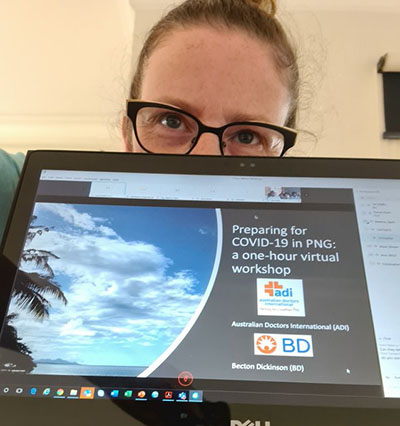
For many, the word paradise may conjure to mind scenery much like that of New Ireland and West New Britain provinces in Papua New Guinea (PNG). Inland from crystal blue waters, coral reefs and white sandy shores, lies rugged terrain, dense with tropical rainforest and volcanic mountains. The setting appears pristine, especially in the most rural areas where the landscape is largely untouched by modern infrastructure like roads, water pipelines or electrical lines.
This lack of infrastructure, however, presents challenges to getting around and accessing running water or power, which makes it difficult to receive medical equipment and training and to deliver lifesaving care. That’s why Australian Doctor’s International (ADI) and BD have established a long-standing collaboration to bring training to hospitals in these provinces in areas such as infection prevention, laboratory pathology (for testing for prevalent diseases such as Malaria, HIV and Tuberculosis), medical equipment operations and more. On the most recent BD Volunteer Service Trip to PNG, our associates installed solar panels to restore power to a clinic that for years had not been able to afford the gasoline needed to fuel their generators.
What impact could a global pandemic have on remote areas of PNG?
“One of the saving graces for PNG is that it’s so isolated,” said David Carr, a business development manager for BD in Australia, who had worked first in Africa with our President’s Emergency Plan for AIDS Relief (PEPFAR) partnership before the partnership with ADI enabled a more local program in PNG. “Most of the population is isolated to particular areas purely because they just can’t get to other areas. There’s no transport available.” Thus far, the isolation may have largely insulated many people from exposure to COVID-19, though Carr had recently heard of potential coronavirus cases in Western Province. However, experts cannot verify cases and epidemiologists struggle to gain an accurate picture of infection rates, since COVID-19 testing ability is very limited.
Despite there only being a few reported potential cases to date, experts worry that Sars-CoV-2 virus could be devastating to communities within PNG. “The population lives very closely together in houses, and a number of families may live in the same house,” Carr said. “If COVID-19 gets into the community, it would spread very quickly.”
Given the highly communicable nature of the virus, prevention is critical. Ensuring that clinicians are properly trained in infection prevention protocol, including how to use personal protective equipment (PPE), can help healthcare workers (HCWs) contain current cases and prevent further transmission via unnecessary exposure. “The knowledge and expertise shared by BD volunteers will assist PNG health facilities in their COVID-19 preparedness and in turn strengthen local health systems and protect frontline health workers,” said Yaman Kutlu, senior program manager with ADI.
Helping clinicians in the remote areas
Given the resource constraints many hospitals in regions of PNG face compared to hospitals in more developed countries, HCWs may have different levels of education and standards of care. “While they do have trained doctors, a lot of their HCWs have not had access to robust training, and access to tools is limited,” said Debra Davidson, a clinical nurse consultant with BD in Australia who previously specialized in infection prevention. That’s why, when the COVID-19 crisis hit and ADI approached BD for support in training PNG clinicians virtually, Davidson volunteered immediately. “I read an article that staff were using empty rice bags as gloves,” Davidson said. “From an infection prevention point of view, not having access or having minimal access to PPE – and also not always having water to wash their hands – was a big concern for me.”
ADI donated PPE and, together, BD and ADI quickly built a virtual training program tailored to the needs and the resources available at different hospitals. Beginning with very isolated facilities that have only basic equipment, BD and ADI volunteers remotely trained HCWs on topics like how to properly put PPE on and take it off, social distancing, good general hygiene practices and triage. “In the virtual trainings, you can see that the HCWs are taking it very seriously, because they see it as a benefit to them and their community,” Carr said. “I feel privileged to be part of this and that I’ve had the ability to make a difference in this way.”
After each session, ADI works with the hospitals to gain feedback to improve the presentations. Despite some challenges around language complexities and internet connectivity, Carr said, “All hospitals so far have been very thankful and have all gained something.” These hospitals have requested additional sessions.
Some clinicians have followed up for further advice. For example, one doctor emailed Davidson to ask about infection prevention advice when using ponchos as makeshift medical gowns. “I’m very humbled by the thought that I’ve been able to be involved in this and to continue to help,” Davidson said.
Emphasizing the importance of this training at this time, Kutlu added, “The commitment and willingness of BD volunteers to help our colleagues in PNG has been exemplary, and we are already seeing the positive impact of this engagement.”
Expanding digital capabilities to BD Volunteer Service Trip initiatives
This year marks the 15th anniversary of the BD Volunteer Service Trip program. In-person BD Volunteer Service Trips have been postponed due to the COVID-19 pandemic, however, BD is now working with non-profit partners to create opportunities for associates to volunteer virtually, from the safety of their own homes. By delivering virtual trainings and finding new ways to integrate telehealth offerings, BD volunteers are leveraging technology to break down barriers to high-quality care.
In the future, BD volunteers can continue using this technology to supplement in-person service opportunities, allowing them to conduct regular check-ins and provide additional support to help ensure progress and proper implementation of learned skills and practices.
Subscribe to receive BD blog alerts